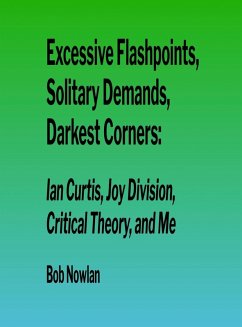In Excessive Flashpoints, Solitary Demands, Darkest Corners: Ian Curtis, Joy Division, Critical Theory, and Me I inquire into issues of fundamental and ultimate concern: the meaning, value, and purpose of existence; our responsibility to and for others; human beings as complex, multiple, contradictory, and dynamic; the challenge of intimacy and the power of love; the quest for authenticity and the struggle for integrity; what it means to be included and excluded along with how as well as why this occurs; how social change happens along with what can be the contribution of artistic and cultural work toward this transformation; and the ethical responsibility to confront myriad metaphorical 'darknesses' in our individual and social lives, despite how challenging, difficult, and painful such confrontation can so often be. I pursue this inquiry by staging a dialogue between critical theory and popular music. I explore how intelligent, sensitive popular music engages the same issues as does critical theory and can help us to better understand and especially better feel how vital, urgent, concrete, and relevant critical theory can be. I use the music as art of pioneering post-punk musician Ian Curtis and his band Joy Division as my vehicle in so doing, drawing upon my experience teaching five upper level undergraduate university classes focused on Ian Curtis, Joy Division, and Critical Theory, at the University of Wisconsin-Eau Claire: English 484, Seminar in Theory and Criticism: Ian Curtis and Joy Division in (Historical and Cultural) Context, Fall 2011; English 484, Seminar in Theory and Criticism: Ian Curtis, The Myth and The Music, Fall 2014; Honors 304, Ian Curtis and Joy Division: Critical Theoretical Perspectives, Fall 2016; Honors 337, Ian Curtis and Joy Division: Critical Theoretical Perspectives, Fall 2017; and English 484, Seminar in Theory and Criticism: 'Let's Take a Ride Out, See What We Can Find': Popular Music, Issues of Fundamental and Ultimate Concern, Empathy and Solidarity-Ian Curtis, Joy Division, and Critical Theory, Spring 2019. The work my students have done in these classes, and their enthusiasm for what we have explored together, inspires me to write this book-as does my now 45+ years' immense passion for Ian Curtis and Joy Division, life and work, and, especially, music as art. Joy Division has been my persistently all-time favorite musical group and Ian Curtis my persistently all-time favorite individual musician, and the work I have done in teaching the aforementioned classes, and on this book, represents my attempt to account for how and why that might be. Accordingly, and following advice of colleagues who attended two public presentations concerned with my work teaching and writing about Ian Curtis, Joy Division, and critical theory, this book is a part personal memoir. As a part personal memoir, I make reference to diverse areas and periods of my life-experience but I concentrate on my 38 years as a university teacher, and in particular as a teacher of critical theory and of critical studies in literature, film, television, popular music, and popular culture. This is a book, in sum, for anyone who loves popular music, who cares to think and talk about 'big issues', who believes in the importance of empathy, and who would like to help contribute toward forging a substantive culture of solidarity-especially by engaging with what popular culture, and in particular popular music, has to offer in that quest. I hope this book will show readers that critical theory can be concrete, relevant, and urgent-especially in sustained dialogue with popular culture and in particular popular music-and that popular culture, notably popular music, can, in turn, contribute meaningful and impactful ways of helping make sense of, along with meaningful and impactful modes of helping engage with, issues of ultimate and fundamental importance.
Hinweis: Dieser Artikel kann nur an eine deutsche Lieferadresse ausgeliefert werden.
Hinweis: Dieser Artikel kann nur an eine deutsche Lieferadresse ausgeliefert werden.

